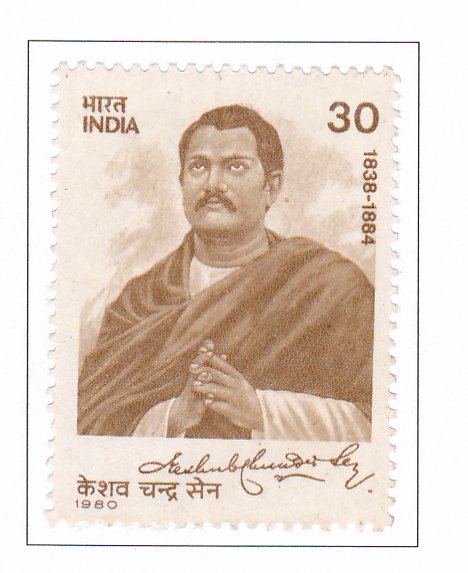Keshub Chunder Sen (1838-1884) Commemoration

Technical Data
| Date of Issue | April 15, 1980 |
|---|---|
| Denomination | 30 p |
| Quantity | 3,000,000 |
| Perforation | comb 13 |
| Printer | Security Printing Press, Nashik |
| Watermark | Large Star and 'INDIA GOVT' (Sh) [Up] |
| Colors | Bistre brown |
| Catalog Codes |
Michel IN 823 Stamp Number IN 862 Yvert et Tellier IN 618 Stanley Gibbons IN 965 |
| Themes | Commemoration | Famous people | Reformers |
Keshub Chunder Sen, born into the illustrious family of Sens of Colootola in Calcutta on November 19, 1838, was a luminary of the Bengal Renaissance. Educated at the Hindu College, founded by his grandfather Ramkamal Sen, Keshub immersed himself in the study of philosophy, history, Sanskrit literature, the Gita, and the Vedas. Influenced by Rajnarayan Bose’s tract on ‘Brahmoism,’ he joined the Calcutta Brahmo Samaj during India’s first war of independence in 1857.
Keshub expanded the principles of Brahmoism to encompass social reforms, including the eradication of untouchability and casteism, promotion of women’s education, vernacular and vocational education, and temperance. His journey in social reform began at the age of 19 when he established an evening school for adults. He advocated against polygamy and child marriage and promoted inter-caste marriages through legislation.
A prolific writer and journalist, Keshub utilized the press as a platform for social awareness and improvement. He founded the ‘Indian Mirror’ in 1861, which later became a daily in 1871. He traveled extensively across India and England, engaging with luminaries such as Max Mueller, John Stuart Mill, and Gladstone.
Keshub’s contributions extended to the establishment of numerous educational, social, and spiritual institutions. Regarded as a major prophet of Brahmoism after Rammohun Roy and Devendranath, he was not only a religious and social reformer but also a fervent nationalist. He advocated for indigenous growth in society and preached the Navavidhan, the New Dispensation or the Religion of Harmony, emphasizing unity, peace, and the synthesis of reason, faith, and social duty.
Keshub Chunder Sen passed away on January 8, 1884, leaving behind a legacy of social and religious reformation. The Indian Posts and Telegraphs Department commemorates his contributions by issuing a special stamp, paying homage to his outstanding role in shaping the social and religious landscape of India.
